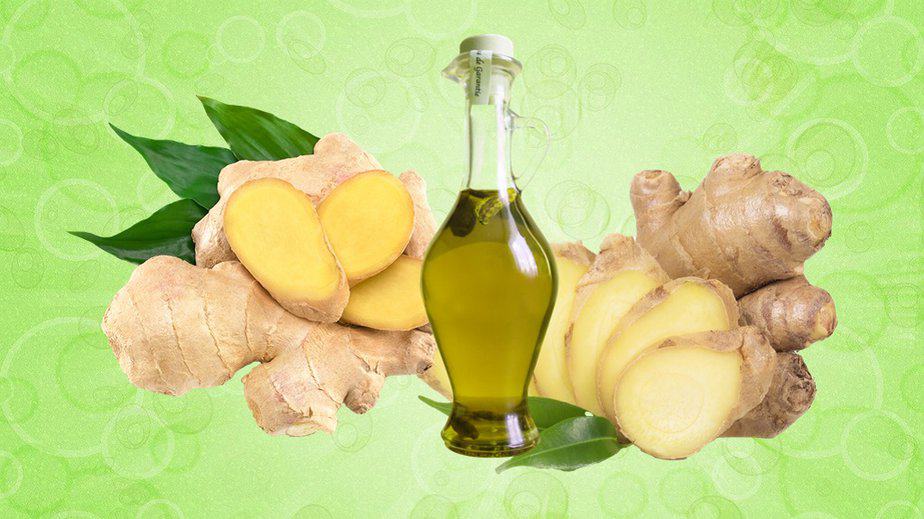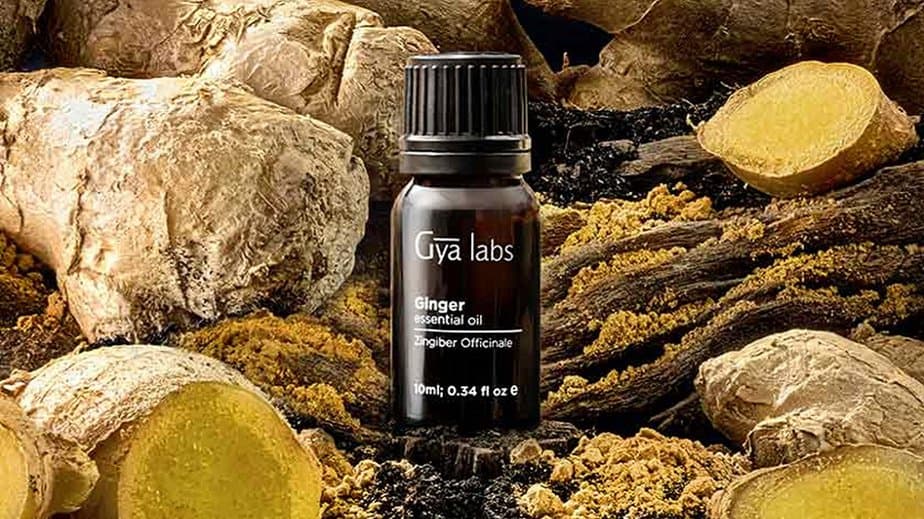The ginger essential oil, also known as “ginger root oil,” is extracted from ginger root or Zingiber officinale.
Ginger is one of the oldest known folk medicines, used for several common ailments. The pungent aromatic rhizome can help soothe respiratory discomforts, fever, colds, nausea, rheumatism, arthritis, menstrual issues, and inflammation. This root is also often used in cooking for flavoring and as an anti-microbial food preservative.
Ginger oil is a prized healing ingredient, extensively used in many Ayurvedic medicines. According to Gya Labs, ginger oil benefits include, soothing common emotional issues such as nervousness, anxiety, fear, sadness, and lack of self-confidence. It’s also very useful for hair growth, skincare, and weight loss.
The Goodness of Ginger Essential Oil
The ginger essential oil is extracted from the ginger rhizome through a lengthy process of distillation. It’s a highly concentrated essence of ginger roots.
This oil has a distinct aroma that is strong, woody, spicy, or warm. For this reason, it’s one of the most utilized oils in aromatherapy.
The uses and benefits of ginger oil spring from its many useful chemical properties. Its major chemical constituents are:
Camphene: A soothing antioxidant and anti-inflammatory agent.
B-Phelandrine: An aromatic property with antiviral, bactericidal, antiseptic, and decongestant effects.
Pinene: A bronchodilator that has antiseptic, anti-inflammatory, and expectorant properties.
Geranial: An aromatic substance capable of producing insecticidal and antioxidant effects.
Zingiberene: Produces the scent of ginger and has antiseptic, antioxidant, and antiviral properties.
Β-Bisabolene: An effective anti-allergy and anti-inflammatory substance; it also gives ginger a warm, woody, and fruity flavor.
Β-Sesquiphellandrene: Generates carminative, antiviral, and stomachic properties.
Curcumene: An effective hypotensive and analgesic constituent with anti-inflammatory and antioxidant properties.
10 Health Benefits of Ginger Essential Oil
Gingerol, the most important constituent of ginger oil, is highly reputable for its anti-inflammatory and antioxidant properties.
When used in aromatherapy, this oil produces an energizing effect that calms the mind and boosts confidence. For this reason, it is also known as “The Oil of Empowerment.”
The traditional use of ginger essential oil vouches for several health benefits. A few of those benefits are supported by evidence from studies, but many don’t have any scientific backing.
Here are some of the best-known health benefits of ginger oil:
1. Heals Infections
The antiseptic and antifungal properties of this oil inhibit or kill germs. When a few drops of diluted oil are taken by mouth, bacterial dysentery, food poisoning, and intestinal infections may be suppressed.
2. Reduces Inflammation
The zingibain compound in the oil is a powerful anti-inflammatory agent. The use of this oil helps to relieve pain, significantly, including muscle pain, migraines, arthritis, and bruises. Furthermore, study results indicate that ginger essential oil can reduce prostaglandins, the pain-causing compounds in the body.
An animal study has shown that the use of this oil for a month increases the levels of enzymes in the blood. This helps to scavenge free radicals and significantly reduces acute inflammation, which is good for suppressing the growth of cancerous cells in the body.
3. Improves Gut Health And Digestion
In folk medicine, ginger oil is a frequently used natural remedy for treating indigestion, diarrhea, vomiting, intestinal spasms, and sour stomach.
It’s an effective home remedy for nausea caused by motion sickness or a change of disposition. It can be inhaled through the nose to suppress nausea.
An animal study showed that ginger oil is useful in inhibiting stomach ulcers by 85 percent. Test results indicate that the ethanol-induced lesions in the rat’s gastric wall were significantly reduced after taking ginger oil.
4. Reduces Respiratory Problems
It’s a natural remedy for, bronchitis, asthma, dyspnea, flu, colds, and coughs. It works as an expectorant to signal the body to increase the secretions in the respiratory tract. The anti-inflammatory properties of this oil relieve the complications of an asthma attack by relaxing the airway muscles.
5. Supplies Antioxidants
The ginger root contains a very high level of antioxidants, surpassed only by some types of berries and pomegranates. The potential antioxidants in ginger oil can help prevent cell damage. It’s excellent for alleviating cancer, dementia, and coronary diseases. This oil may reduce age-related markers of oxidative stress and reduce oxidative damage.
6. Improves Heart Health
Ginger essential oil helps to lower cholesterol levels and the incidence of blood clots. It is useful for clearing blood vessel blockages that lead to heart attack or stroke. It also works to improve lipid metabolism, thus reducing the risk of cardiovascular disease and diabetes.
7. Reduces Anxiety And Stress
Aromatherapy with ginger and lavender oil effectively reduces feelings of anxiety, depression, stress, and burnout. The warming and soothing compounds in this oil promote good sleep and stimulate a feeling of confidence and courage.
8. Improves Liver Health
The powerful antioxidants in ginger oil’s hepatoprotective activity help in reducing alcoholic fatty liver disease. It improves crucial activities of the liver like metabolism, digestion, and detoxification. Also, it reduces the occurrence of liver cirrhosis and cancer.
9. Supplies Aphrodisiac Properties
The warming and stimulating elements in ginger oil increase libido and improve conditions like impotence and loss of libido. Ginger is one of the key ingredients in many traditional aphrodisiac supplements. In addition, it enhances the mood by reducing anxiety and stress.
10. Relieve Dysmenorrhoea Pain
The anti-inflammatory and antiseptic compounds in ginger, such as zingibain, help to relieve menstrual cramps, back pain, headaches, and premenstrual pain.
Ingesting two to three drops of ginger essential oil daily is effective for managing joint and muscle pain. It does so by reducing inflammation and increasing circulation.

Ginger Oil For Hair Growth
You’ll find many claims on the web regarding the effectiveness of ginger oil for hair growth or preventing hair loss. However, it isn’t scientifically proven to prevent hair loss or promote hair regeneration. Yet, the anti-inflammatory properties of this oil may help in clearing certain scalp conditions.
This oil has many antimicrobial qualities. When applied to the hair with a carrier oil, it may help in eliminating dandruff, which is a major reason for hair loss. The antioxidants in this oil may also reduce premature graying by increasing the pigment of the hair.
Despite being a natural substance, it can produce side effects in some people.
Ginger Oil For Skin
This oil is an important ingredient in many natural skincare products.
What is it used for?
The astringent and anti-inflammatory qualities of this oil work to repair the epidermis. Its healing effect replenishes the skin and slowly erases blemishes, hyperpigmentation, or more stubborn scars.
With many potential antioxidant properties, it protects the skin against free radicals. Thus, it may help to improve elasticity and complexion and prevent premature aging of the skin.
This oil helps to detoxify the skin; it works as a cleansing agent. It’s often an important ingredient in many facial oils for healing acne. This oil reduces the occurrence of acne by clearing the clogged pores on the skin.
Weight Loss With Ginger Oil
According to some studies, ginger may be useful for weight loss. The antioxidants and anti-inflammatory compounds in the oil may help burn fat and regulate blood sugar levels.
It reduces stress, inflammation, and cravings for carbs-rich sugary items. Above all, it supports digestion by enhancing the metabolic rate. The thermogenic effect of the oil can help to burn fat.
According to a 2017 study, ginger may help with weight loss because of its thermogenic effect and may increase the breakdown of fat (lipolysis), suppress lipogenesis (creation of fat), and regulate appetite.
Conclusion
Ginger essential oil is used in aromatherapy for warming and stimulating. It soothes and reduces stress, anxiety, dizziness, fatigue, and lethargy.
When topically used, this essential oil eliminates bacteria, purifies, and inhibits the signs of skin damage and aging.
When used as hair oil, it cleans the scalp and clears itchiness and dryness. This oil improves blood circulation on the scalp, which helps with the better growth of hair. The antimicrobial properties of the oil remove dandruff and eliminate other infections on the scalp.
Ingesting a few drops of ginger oil helps to detoxify the body, boost digestion, and clear common stomach issues. Also, it can soothe aches, reduce inflammation, help with weight loss, and remove congestion in the respiratory tract.
